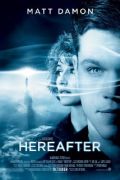
Directed by
Clint Eastwood
129 minutes
Rated M
Reviewed by
Bernard Hemingway

Hereafter
Synopsis: After a near-death experience a French TV journalist Marie LeLay (Cécile De France) reassesses her life. After his twin brother is run over and killed by a car, a London boy Marcus (George McLaren) is desperate to maintain their close connection. And, in San Francisco, lonely George (Damon) is trying to find a way to live with his ability to talk with the dear departed. Ultimately these three lives will connect.Although I have not seen all of Clint Eastwood’s films, his latest confirms me in my belief that as a film-maker he is a greatly over-rated. He has a knack for endowing his subject matter with cinematic gravitas, something which he perhaps first encountered through working with that master stylist, Sergio Leone. But Leone was an innovator and, despite his admirable interest in larger issues, Eastwood is quite conventional in his approach to story telling in both form and content, meaning that his films appear to be a lot better than they actually are.
Hereafter begins with the recreation of a tsunami sweeping away a Pacific island coastal town and with it Marie LeLay who however survives it to become one of the film’s three story lines. This is a marvellously effective sequence but it is a creative height which the film never regains. For a start there are problems with the tri-partite structure which although tied together neatly enough at the film’s end remain separate for most of it, the film switching from one story to the other with no apparent reason other than to synchronize then to their final intersecting destination. The disengagement in emotional commitment that results from this jumping about is compounded by the fact that each of the stories looks different, as if Eastwood had contracted separate units to make the English sequence in the style of Mike Leigh, all drab grey blue visuals and South London accents, the French sequence in just about any glossy French director’s style while he stayed on to make the San Francisco story.
Not surprisingly, it is this strand that is the most effective. It probably could have sustained a film on its own with Damon again demonstrating how versatile an actor he is but screenwriter Peter Morgan, who has done such outstanding work with hard-nosed subjects in The Deal, The Queen, Frost/Nixon, The Damned United and, recently The Special Relationship, clearly had aspirations to tackle more metaphysical matters. This however is where the fundamental shortcoming of the film lies – its stylistic gravitas notwithstanding - it is ultimately superficial in the most familiar of Hollywood ways.
Let’s face it, no-one knows anything about the hereafter and with our material-rationalist mindset we are particularly ill-equipped to come to terms with it or in any way imagine it. Understandably, however there have been many attempts to deal with it in film. In recent years Coppola tried to tackle it philosophically with muddled results in Youth Without Youth (2007) and Darren Aronofsky took a more literary approach in his convoluted The Fountain (2006) whilst in 1998 Vincent Ward went all New Age with What Dreams May Come with a similar subject. Whatever shortcoming these films had, they at least ambition, but Eastwood’s film is more in the M. Night Shyamalan territory of seances, hauntings and telekinetic phenomena.
Morgan’s script is at pains to make a distinction between George’s genuine psychic powers and the many charlatans who claim to possess them and Damon does a great job in making his character credible but as his ultimate reading with young Marcus amply demonstrates, this proposition is as much a charade as anyone rubbing a crystal ball or reading tea leaves and purporting to tell the future. That Eastwood then goes even further into silliness by confusing George’s psychic powers with the wishful imaginings of romantic illusion is to say the least, incongruous. That he manages to make all this appear to be a reflection on the after life (also the title of a 2009 film in which Liam Neeson has the ability to speak with the dead) is, however, a testament to his skills as a film-maker. It does not make Hereafter a great film but rather a polished piece of showmanship.
There is another film in Morgan’s script and that is one about how we make the experience of death, or indeed, the unknown and the unknowable in general, more manageable by figuring it in terms of our own understanding. Hopefully a more imaginative director than Eastwood will make that film, although I wouldn’t like their chances of finding an audience.

Want more about this film?


Want something different?




